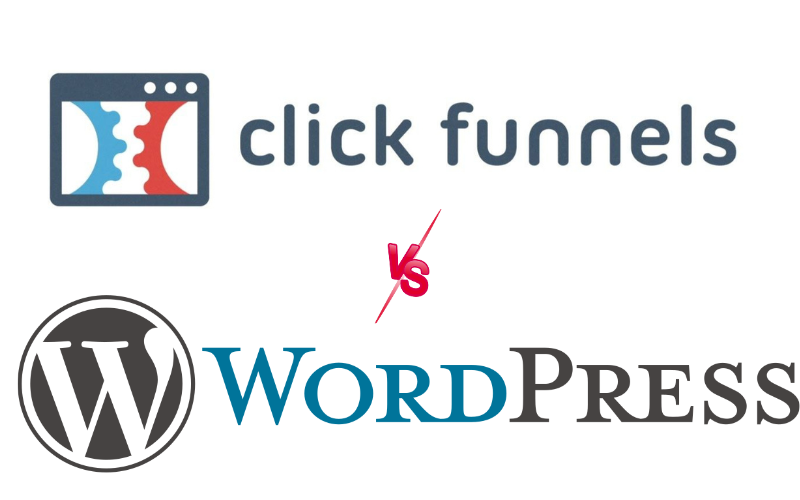6 January 2024

Table of contents
1. Ease of Use and Accessibility: Getting Started with ClickFunnels vs. WordPress
ClickFunnels: Streamlined Funnel Building
ClickFunnels prioritizes a simplified user experience. Its drag-and-drop interface enables quick funnel creation, appealing to beginners. The platform offers predefined templates, reducing setup time. Users with limited technical skills find it accessible, as it requires no coding. This ease of use makes ClickFunnels a preferred choice for individuals focusing on marketing and sales funnels. However, for more extensive customization, a learning curve exists. Overall, ClickFunnels streamlines the funnel-building process, embedding the focus keyword “ClickFunnels vs. WordPress” as a user-friendly option.

WordPress: Versatile Content Management
WordPress, known for its versatility, powers diverse websites. Its extensive theme and plugin repository enhance site functionality. Users appreciate WordPress for its robust content management capabilities. Unlike ClickFunnels, WordPress offers in-depth customization, appealing to users with some technical background. However, this freedom comes with complexity, requiring more time to learn. WordPress’s open-source nature invites a community-driven approach, providing extensive resources and support. It’s a versatile choice in the “ClickFunnels vs. WordPress” debate, suitable for those seeking comprehensive control over their website design and content.

2. Customization and Flexibility
ClickFunnels: Tailored Funnel Design
ClickFunnels excels in providing a focused and tailored funnel creation experience. Users can customize funnels with various templates. Each template is adaptable, allowing for branding and design changes. While customization is somewhat limited compared to WordPress, it’s sufficient for targeted marketing goals. ClickFunnels integrates well with various marketing tools, enhancing its flexibility. In the context of “ClickFunnels vs. WordPress”, ClickFunnels is optimal for users who prioritize streamlined, marketing-focused websites with less emphasis on broad customization.
WordPress: Unlimited Creative Freedom
WordPress stands out for its unparalleled customization and flexibility. With thousands of themes and plugins, users can craft virtually any website. The platform supports extensive customization, from layout changes to functional enhancements. Users with coding knowledge can further tailor their site. This adaptability makes WordPress a robust contender in the “ClickFunnels vs. WordPress” comparison. It’s ideal for users seeking comprehensive control over their website’s appearance and capabilities, from simple blogs to complex e-commerce sites. Despite its steep learning curve, the flexibility and power of WordPress are unmatched.
3. Search Engine Optimization (SEO) Capabilities
ClickFunnels: Optimized for Conversion
ClickFunnels focuses on optimizing for conversions, which indirectly benefits SEO. It provides basic SEO functionalities for landing pages, allowing users to edit meta titles, descriptions, and incorporate keywords. This ensures that individual funnels are discoverable and rank for targeted terms. However, its primary focus isn’t extensive SEO, but rather creating high-converting funnels. In the “ClickFunnels vs. WordPress” debate, ClickFunnels suits users looking for quick, SEO-friendly landing pages geared towards immediate conversions.
WordPress: Comprehensive SEO Mastery
WordPress is renowned for its robust SEO capabilities. With plugins like Yoast SEO, users can extensively optimize every aspect of their site. From detailed content analysis to technical SEO enhancements, WordPress covers all grounds. Its flexibility allows for optimization of URLs, page speed, and mobile responsiveness — all crucial SEO factors. This makes WordPress a powerhouse in the “ClickFunnels vs. WordPress” comparison for users intent on a long-term, comprehensive SEO strategy. Its open-source nature also means continual updates and improvements in SEO practices.
4. Integrations and Extensions
5. Pricing and Value


6. User Testimonials and Case Studies
Conclusion
Consider this comparison as a starting point, and dive deeper into each option.
Related Articles
Harness the Power: 5 AI Tools Transforming Industry Landscapes
Welcome to "Harness the Power: 5 AI Tools Transforming Industry Landscapes". Discover how AI revolutionizes sectors from healthcare to finance. We'll explore key tools, their impacts, and future trends. Join us in uncovering the transformative power of AI in today's...
Later vs. Hootsuite 2024 – Which is the Best Social Media Management Tool?
In the battle of Later vs Hootsuite 2024, selecting the right tool is crucial for social media success. Both platforms offer unique features to streamline your workflow. This comprehensive comparison will guide you through their functionalities. Whether you're an...
ThriveCart vs ClickFunnels 2024 – Which is the Best Marketing Tool for E-commerce?
ThriveCart vs ClickFunnels : In 2024, choosing the right marketing tool for e-commerce is more critical than ever. As you navigate the world of online selling, understanding the capabilities and differences between ThriveCart and ClickFunnels is essential. This post...
Stay Up to Date With The Latest News & Updates
Join Us on a Journey to Digital Excellence
At DigMarkit, we’re more than just a platform; we’re a community committed to fostering growth and excellence in the digital marketing sphere. Whether you’re looking to refine your skills, explore new trends, or revolutionize your marketing strategy, we’re here to guide you every step of the way.
Join Our Newsletter
Embrace the digital marketing revolution with DigMarkit – Your gateway to mastering the digital world!



